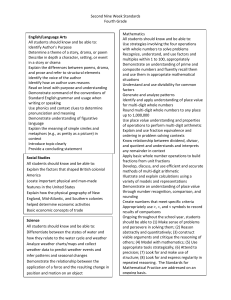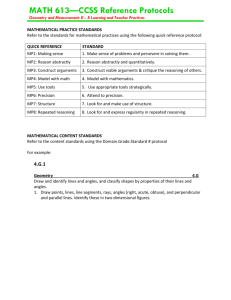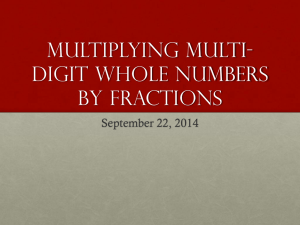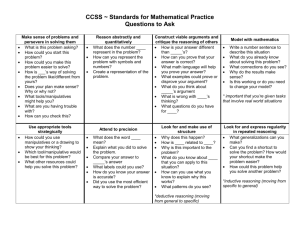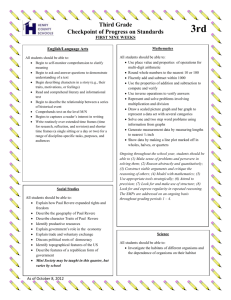Fourth Grade - Henry County Schools
advertisement
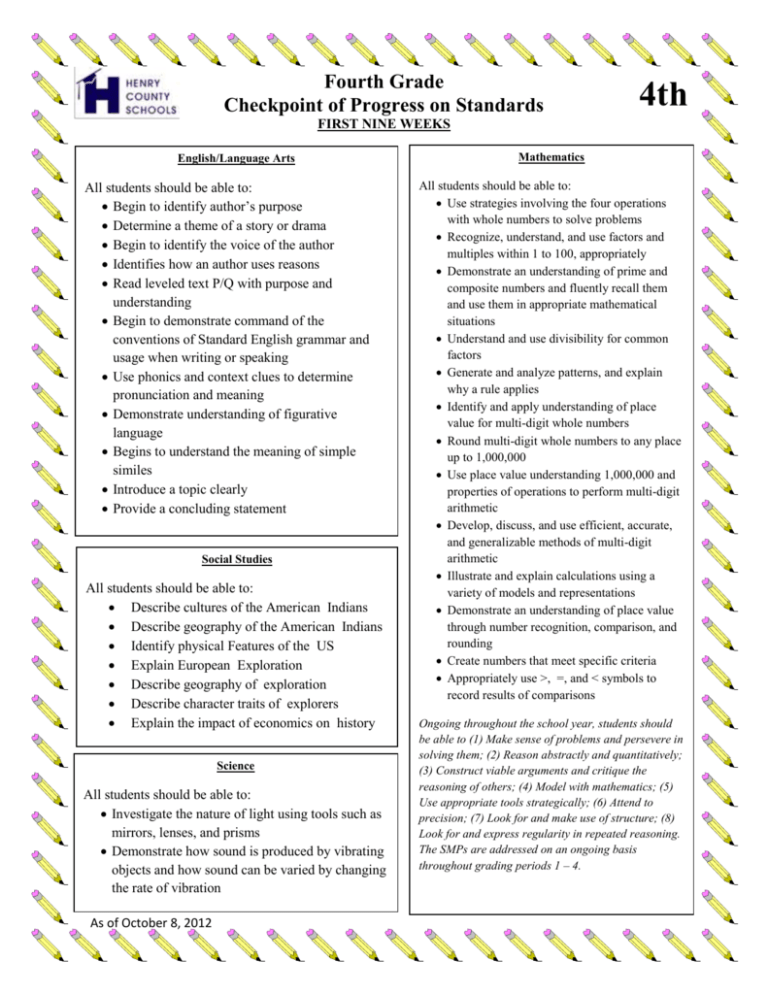
Fourth Grade Checkpoint of Progress on Standards 4th FIRST NINE WEEKS English/Language Arts All students should be able to: Begin to identify author’s purpose Determine a theme of a story or drama Begin to identify the voice of the author Identifies how an author uses reasons Read leveled text P/Q with purpose and understanding Begin to demonstrate command of the conventions of Standard English grammar and usage when writing or speaking Use phonics and context clues to determine pronunciation and meaning Demonstrate understanding of figurative language Begins to understand the meaning of simple similes Introduce a topic clearly Provide a concluding statement Social Studies All students should be able to: Describe cultures of the American Indians Describe geography of the American Indians Identify physical Features of the US Explain European Exploration Describe geography of exploration Describe character traits of explorers Explain the impact of economics on history Science All students should be able to: Investigate the nature of light using tools such as mirrors, lenses, and prisms Demonstrate how sound is produced by vibrating objects and how sound can be varied by changing the rate of vibration As of October 8, 2012 Mathematics All students should be able to: Use strategies involving the four operations with whole numbers to solve problems Recognize, understand, and use factors and multiples within 1 to 100, appropriately Demonstrate an understanding of prime and composite numbers and fluently recall them and use them in appropriate mathematical situations Understand and use divisibility for common factors Generate and analyze patterns, and explain why a rule applies Identify and apply understanding of place value for multi-digit whole numbers Round multi-digit whole numbers to any place up to 1,000,000 Use place value understanding 1,000,000 and properties of operations to perform multi-digit arithmetic Develop, discuss, and use efficient, accurate, and generalizable methods of multi-digit arithmetic Illustrate and explain calculations using a variety of models and representations Demonstrate an understanding of place value through number recognition, comparison, and rounding Create numbers that meet specific criteria Appropriately use >, =, and < symbols to record results of comparisons Ongoing throughout the school year, students should be able to (1) Make sense of problems and persevere in solving them; (2) Reason abstractly and quantitatively; (3) Construct viable arguments and critique the reasoning of others; (4) Model with mathematics; (5) Use appropriate tools strategically; (6) Attend to precision; (7) Look for and make use of structure; (8) Look for and express regularity in repeated reasoning. The SMPs are addressed on an ongoing basis throughout grading periods 1 – 4. Fourth Grade Checkpoint of Progress on Standards 4th SECOND NINE WEEKS The standards listed on this page are in addition to those taught during the first nine weeks English/Language Arts Mathematics All students should be able to: Identify Author’s Purpose Determine a theme of a story, drama, or poem Identify the voice of the author used to tell a story Explain how an author uses reasons and evidence Reads leveled text Q with purpose and understanding Demonstrate command of the conventions of standard English grammar and usage when writing or speaking Uses phonics to determine pronunciation and meaning Demonstrate understanding of figurative language Explain the meaning of simple similes and metaphors (e.g., as pretty as a picture) in context Introduce a topic clearly and group related information in paragraphs and sections to aid in comprehension Provide a concluding statement All students should be able to: Use strategies involving the four operations with whole numbers to solve problems Recognize, understand, and use factors and multiples within 1 to 100, appropriately Demonstrate an understanding of prime and composite numbers and fluently recall them and use them in appropriate mathematical situations Understand and use divisibility for common factors Generate and analyze patterns Identify and apply understanding of place value for multidigit whole numbers Use place value understanding and properties of operations to perform multi-digit arithmetic Explain and use fraction equivalence and ordering in problem solving contexts Apply basic whole number operations to build fractions from unit fractions Know relationship between dividend, divisor, and quotient and understands and interprets any remainder in context Understand place value through number recognition, comparison, and rounding Create numbers that meet specific criteria Use >,=, and < symbols to record results of comparisons Round multi-digit whole numbers to any place up to 1,000,000 Social Studies Ongoing throughout the school year, students should be able to (1) Make sense of problems and persevere in solving them; (2) Reason abstractly and quantitatively; (3) Construct viable arguments and critique the reasoning of others; (4) Model with mathematics; (5) Use appropriate tools strategically; (6) Attend to precision; (7) Look for and make use of structure; (8) Look for and express regularity in repeated reasoning. The SMPs are addressed on an ongoing basis throughout grading periods 1 – 4. All students should be able to: Discuss British Colonial America Describe geography of the colonies Describe federal system of government Explain positive character traits of colonists Identify and describe causes, events and results of American Revolution Describe geography of the Revolution Explain the impact of geography on war Discuss the Declaration of Independence Describe the impact of economics on history As of October 8, 2012 Science All students should be able to: Demonstrate how sound is produced by vibrating objects and how sound can be varied by changing the rate of vibration Demonstrate the relationship between the application of a force and the resulting change in position and motion on an object Fourth Grade Checkpoint of Progress on Standards 4th THIRD NINE WEEKS The standards listed on this page are in addition to those taught during the first and second nine weeks English/Language Arts All students should be able to: Identify author’s purpose with support from the text Determine a theme/topic of a story, drama, poem, or informational text from details in the text Identify the voice of the author used to tell a story and explain how that voice impacts the experience Explain how an author uses reasons and evidence to support particular points in a text Read leveled text Q/R with purpose and understanding Demonstrate command of the conventions of standard English grammar and usage when writing or speaking Use phonics and context clues and graphic features Demonstrate understanding of figurative language and word relationships Explain the meaning of simple similes and metaphors (e.g., as pretty as a picture) in context Introduce a topic clearly and group related information in paragraphs and sections; include formatting (e.g., headings), illustrations, and multimedia when useful to aiding comprehension Provide a concluding statement or section related to the opinion, information, or story presented Mathematics All students should be able to: Continue work and understanding of standards from previous two nine week periods Understand decimal notation for fractions, and compare decimal fractions Draw and identify lines and angles, and classify shapes by properties of their lines and angles (including line of symmetry) Ongoing throughout the school year, students should be able to (1) Make sense of problems and persevere in solving them; (2) Reason abstractly and quantitatively; (3) Construct viable arguments and critique the reasoning of others; (4) Model with mathematics; (5) Use appropriate tools strategically; (6) Attend to precision; (7) Look for and make use of structure; (8) Look for and express regularity in repeated reasoning. The SMPs are addressed on an ongoing basis throughout grading periods 1 – 4. Social Studies Science All students should be able to: Demonstrate the relationship between the application of a force and the resulting change in position and motion on an object Describe the roles of organisms and the flow of energy within an ecosystem Identify factors that affect the survival or extinction of organisms such as adaptation, variation of behaviors (hibernation), and external features (camouflage and protection) As of October 8, 2012 All students should be able to: Discuss the Articles of Confederation, Constitution, Discuss the Bill of Rights Know the Preamble and “We the People” Explain the Federal System of Government Know and explain the First Amendment Describe the functions of Government Explain Democratic beliefs and ideals Describe character traits Discuss the War of 1812 Explain the Westward Expansion Describe Abolition and Suffrage Locate features of US Identify geography of Westward Expansion Describe the impact of economics on history Fourth Grade Checkpoint of Progress on Standards 4th FOURTH NINE WEEKS The standards listed on this page are in addition to those taught during the first, second and third nine weeks English/Language Arts Mathematics All students should be able to: Identify author’s purpose with support from the text Determine a theme/topic of a story, drama, poem, or informational text from details in the text; summarize the text Identify the voice of the author used to tell a story and explain how that voice impacts the experience Explain how an author uses reasons and evidence to support particular points in a text Reads leveled text S with purpose and understanding Demonstrate command of the conventions of standard English grammar and usage when writing or speaking Uses phonics and context clues and graphic features to determine pronunciation and meaning Demonstrate understanding of figurative language, word relationships, and nuances in word meanings Explain the meaning of simple similes and metaphors (e.g., as pretty as a picture) in context Introduce a topic clearly and group related information in paragraphs and sections; include formatting (e.g., headings), illustrations, and multimedia when useful to aiding comprehension Provide a concluding statement or section related to the opinion, information, or story presented All students should be able to: Continue work and understanding of standards from all previous nine week periods Solve problems involving conversion of measurements from a larger unit to a smaller unit within the same system Solve problems involving measurement including area and perimeter for rectangles Create line plots of measurements expressed in fractions of a unit and solves addition and subtraction problems involving the data presented in the line plot Understand concepts of angles and measuring angles Sketch angles of a specified measure, find the measure of a specified angle by adding its decomposed parts, and solve addition and subtraction problems to find unknown angles on a diagram in real-world situations Social Studies All students should be able to: Make decisions about spending and saving As of October 8, 2012 Ongoing throughout the school year, students should be able to (1) Make sense of problems and persevere in solving them; (2) Reason abstractly and quantitatively; (3) Construct viable arguments and critique the reasoning of others; (4) Model with mathematics; (5) Use appropriate tools strategically; (6) Attend to precision; (7) Look for and make use of structure; (8) Look for and express regularity in repeated reasoning. The SMPs are addressed on an ongoing basis throughout grading periods 1 – 4. Science All students should be able to: Differentiate between the states of water and how they relate to the water cycle and weather Analyze weather charts/maps and collect weather data to predict weather events and infer patterns and seasonal changes Compare and contrast the physical attributes of stars, star patterns, and planets Model the position and motion of the earth in the solar system and will explain the role of relative position and motion in determining sequence of the phases of the moon

